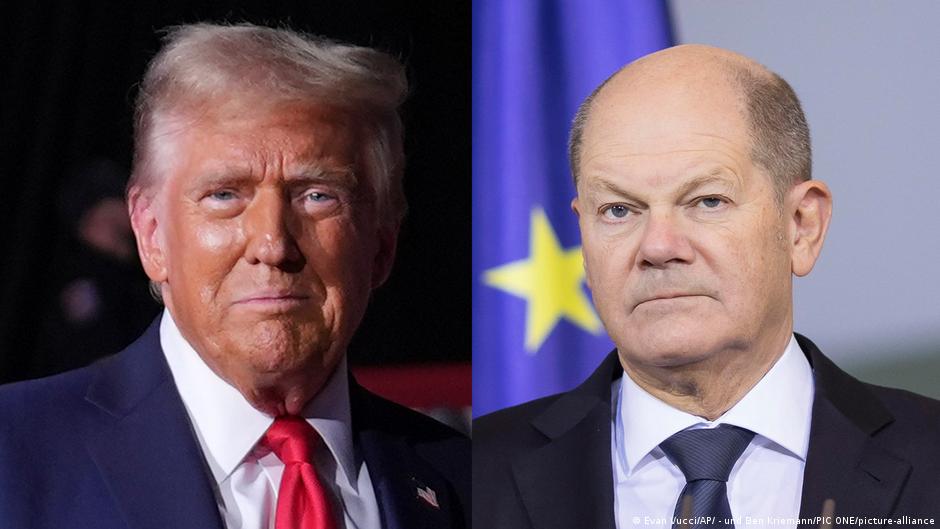Whether threatening to end climate protection policies and slap import tariffs on European goods, or envisioning a new imperialism that lays claim to the Panama Canal and Greenland, Donald Trump has been confirming all the worst fears of many German politicians.
Despite this, German Chancellor Olaf Scholz congratulated the new US president on his inauguration.
Wishing him “strength and success” for the tasks ahead, he added that, “[t]ogether, we can provide crucial momentum on both sides of the Atlantic for freedom, peace and security, as well as prosperity and economic development.”
But Scholz was not present in Washington, nor was Germany’s opposition leader Friedrich Merz from the conservative Christian Democratic Union (CDU). Trump had only invited politically like-minded politicians, such as Italian Premier Georgia Meloni and Argentinian President Javier Milei.
Sensitive diplomatic dispatch
Most German politicians had either hinted or openly stated that they would much rather have seen the Democratic candidate Kamala Harris enter the White House.
Only Germany’s far-right Alternative for Germany (AfD) party seems to be looking forward to another Trump administration. Trump loyalist Elon Musk openly endorsed the AfD on his platform X when he wrote that, “[o]nly the AfD can save Germany” and called Scholz an “incompetent fool.”
Now, a sensitive assessment by Germany’s ambassador to the US, Andreas Michaelis, has contributed to heightened transatlantic tensions. It was a diplomatic cable, intended for German Foreign Minister Annalena Baerbock and leaked to the media, containing strident criticism of Trump.
In it, the ambassador stated that Trump was pursuing an agenda of “maximum disruption,” and largely undermining basic democratic principles and the US system of checks and balances.
The German chancellor candidate for the center-right CDU, Friedrich Merz, considers the paper to be a disaster for German-American relations.
“This is a huge blow to the German government’s reputation in Washington. No one from this federal government will be able to find an interlocutor in Washington any time soon,” Merz said in an interview on the German broadcaster Deutschlandfunk.
Merz: Europeans must stand together
Whereas Chancellor Scholz has adopted a confrontational stance and sharply criticized Trump’s claim to Greenland, Friedrich Merz has been more forthcoming.
According to opinion polls, Merz has a good chance of becoming Germany’s next chancellor after the upcoming elections on February 23. In this case, he would have to deal directly with Trump as head of the German government.
Merz has said that he intends to meet Trump “at eye level” and focus on “bundling European interests.”
“As long as the European member states stand together, they will be respected in the world, including in the US. As long as they are divided, no one will take us seriously,” Merz stated at a Berlin summit of center-right European parties. “So, in my view, this is the final call to action.”
In a hand-written congratulatory letter to Trump, Merz further wrote that, “should the German people give me a mandate for the chancellorship, it will be one of my priorities to work with you towards a new chapter in our relations.”
‘Europe is prepared for tariffs’
The German Chamber of Commerce and Industry, or DIHK, has already warned of serious consequences in view of the threat of US import tariffs. “The effects of new US tariffs would be serious for the German economy,” DIHK Chief Executive Helena Melnikov told the German newspaper Rheinische Post.
In Germany, every fourth job depends on exports, and every second job is industrial, she pointed out.
That’s why, in contrast to Merz, Germany’s Minister of Economic Affairs Robert Habeck from the Green party is taking a more combative stance: “Europe is prepared. If the Americans impose tariffs, which I neither hope nor want, Europe would certainly be in a position to take countermeasures, including those that affect the American economy,” Habeck said in an interview with DW.
Habeck, whose responsibilities also include climate action, called Trump’s announced withdrawal from the Paris climate agreement “a fatal signal for the world.”
But at home, too, he has had to watch issues of climate protection get pushed further and further down the agenda during the ongoing election campaign.
Invited, or not invited
When she was German chancellor, Angela Merkel from the CDU dealt with Trump during his first presidency. Now, she has once again spoken out in favor of continuing a close partnership with the US.
In her recently published memoirs, the long-time politician openly expressed the difficulties she had with Trump at the time.
At her party’s New Year’s reception, Merkel argued that Germany’s transatlantic partnership with the US was more indispensable today than several years ago. She added that it was only possible “to achieve that [Russian President Vladimir] Putin does not win the war and that Ukraine remains an independent state” with the help of the US and within the NATO alliance.
Trump has indicated that he wants to end support for Ukraine and instead seek a quick end to the war with Putin. There are fears that Ukraine will have to make territorial concessions to achieve this.
Meanwhile, the far-right AfD, which remains isolated in the German parliament, sees itself on an upswing thanks to Trump.
The AfD and Trump are close on issues of migration and energy policy. However, the AfD also repeatedly makes anti-American statements. Nevertheless, Trump’s closeness to the AfD was apparent in Washington: While Federal Chancellor Olaf Scholz was not invited to the inauguration, two prominent AfD politicians, Tino Chrupalla and Beatrix von Storch, were present.
This article was originally published in German.
Donald Trump shakes up German politics – DW – 01/21/2025


